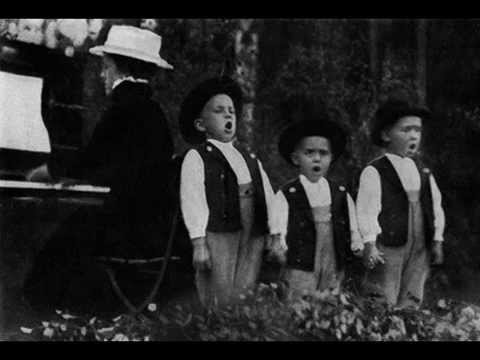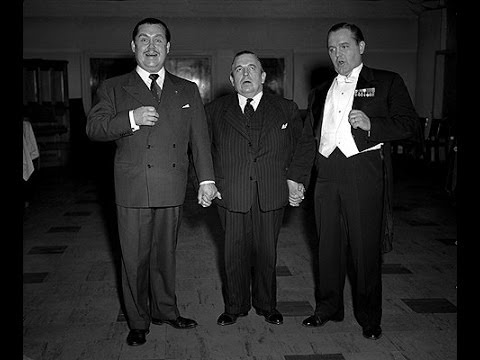|
SATURDEE OPRY LINKS 73:
Summer Joy
 
The Bjorling Brothers! Olle (1909-1965), Jussi (1911-1960) and
Gösta (1912-1957).
And one of the last time they sang together, 1952.
Saturdee Opry Links Overture!
"Das Liebesverbot," by Rossini, I mean, Wagner. (Sure sounds like
Rossini!)
https://www.youtube.com/watch?v=oBAB40dO1xU
1.
Saturdee Opry Links starts with some summer joy, in the form of "Summer Joy," a
beloved Swedish tune sung by three young lads by the names of Olle, Gosta, and
Jussi. Bjorling was the family name. Listen for them giggling at the end. And by
the way, that boy soprano has a hell of a future.
https://www.youtube.com/watch?v=VOlx4gyNm9M
2.
Modern tenor singing began under Rossini. This was the first time that tenors
belted out high C's heroically, instead of resorting to falsetto. Here is one
such example from Rossini's "William Tell." Bryan Hymel sings the
heart-rending, "Asile
héréditaire" ("Ancestral Home.")
https://www.youtube.com/watch?v=mnhIHz6qtIM
Role: Arnold, a Swiss patriot, son of Melcthal
Setting: the ruined house of Melcthal, Altdorf, Switzerland, thirteenth century
Synopsis: Arnold looks upon the ruined house in which he grew up and remembers
his father, who was killed by the Austrians.
Translation:
"Ancestral home
where my eyes opened to the light of day,
only yesterday your protective shelter
offered a father to my love.
I call in vain, o bitter grief!
I call in vain, o bitter grief!
I call, he no longer hears my voice!
I call, he no longer hears my voice!
Beloved walls within which my father dwelt,
I come to see you for the last time!
I come to see you, etc.
Ancestral home
where my eyes opened to the light of day,
beloved walls within which my father dwelt,
I come to see you for the last time!
I come to see you, etc."
Full scene translation:
http://andantemoderato.com/bryan-hymel-sings-asile-hereditaire-rossinis-guillaume-tell/
3.
Today's SOL continues with a song I'd forgotten about, which is entirely the
reason for posting it here: the almost impossibly beautiful "Baïlèro," one of
the "Songs of the Auvergne," folk songs arranged by Joseph Canteloube. Anna
Catarina Antonacci is the mezzo. English subtitles. And might I add, what
GRUESOME lyrics for such a hauntingly beautiful song. . .
https://www.youtube.com/watch?v=MSLL1S6hEg8
Translation:
http://www.lieder.net/get_text.html?TextId=113050
From Wiki:
"Chants d'Auvergne" is a collection of folk songs from the Auvergne region of
France arranged for soprano voice and orchestra or piano by Joseph Canteloube
between 1923 and 1930. The songs are in the local language, Occitan. The best
known of the songs is the "Baïlèro", which has been frequently recorded and
performed in slight variations of Canteloube's arrangement, such as for choir or
instrumental instead of the original soprano solo.
4.
Here is the transporting, ethereally beautiful love duet, "Nuit D'ivresse,"
("Night of Ecstasy"), from "Les Troyens," (1856) by Hector Berlioz, based on
Virgil's Aeneid. Wonderful Shirley Verrett and Nicolai Gedda.
https://www.youtube.com/watch?v=DRgj8pIfwEg
Full translation here:
http://operalively.com/forums/content.php/736-Les-Troyens-Libretto-in-English-Act-IV
DIDO, AENEAS
Endlessly intoxicating night of ecstasy!
Golden Phoebe, and you, great stars of her court,
Shine upon us your blessed light;
Heavenly flowers, smile upon eternal love!
DIDO
On such a night, crowned with golden laburnum,
Your mother Venus followed the fair Anchises
To the groves of Mount Ida.
AENEAS
On such a night, headlong in joyous love,
Troilus came to the foot of Troy’s walls
To await the lovely Cressida.
DIDO, AENEAS
Endlessly intoxicating night of ecstasy!
Golden Phoebe, etc.
AENEAS
On such a night, chaste Diana
Finally shed her diaphanous veil,
In the sight of Endymion.
DIDO
On such a night the son of Cythera
Received coldly the rapturous tenderness
Of Queen Dido!
AENEAS
And on the same night, alas! the unjust queen,
Accusing her lover, obtained from him with ease,
The sweetest of forgiveness.
DIDO, AENEAS
Endlessly intoxicating night of ecstasy, etc.
How it can look on stage:
https://www.youtube.com/watch?v=B9wV4vkVaZU
5.
Here is another gentle love duet sung in moonlight, this being the "Clair de
Lune" sequence from "Werther," by Massenet. Vittorio Grigolo and Joyce DiDonato.
With English subtitles.
https://www.youtube.com/watch?v=0ilQLLRg8MY
From Wiki:
Werther is an opera in four acts by Jules Massenet to a French libretto by
Édouard Blau, Paul Milliet and Georges Hartmann (who used the pseudonym Henri
Grémont). It is loosely based on the German epistolary novel "The Sorrows of
Young Werther" by Goethe, which was based both on fact and on Goethe's own early
life.
About the opera:
https://en.wikipedia.org/wiki/Werther
6.
Quite be accident, it seems that all the links so far (except the Bjorling trio)
are in French. Maybe it's the summer heat. Hard to bear Italian passione when it's 100
degrees. So here is some more French ardor. Anyone who needs an explanation of
the plot of "Romeo and Juliet" should please go back to your texting about
"cool" and "awesome" places to eat. (Aria, sung by Roberto Alagna, begins around
4:20.)
https://www.youtube.com/watch?v=keJqtf1_slc
Role : Roméo, a Montague
Setting : Juliet's balcony at the Capulet estate, Verona, Italy, 14th century
Synopsis : Romeo has escaped from his companions in search of Juliet's room. He
finally spies her on her balcony and sings of her beauty which is like the sun.
The words are almost exactly translated from Shakespeare's Romeo and Juliet.
Translation:
http://www.aria-database.com/translations/romeo07_levetoi.txt
7.
Renee Fleming. "Depuis Le Jour," from Charpentier's "Louise." "Since the day. .
." This is pretty much all that is left of Charpentier's once-popular (1900) and
only opera. Some composers churn them out, some don't. Charpentier had other
rather noble pursuits, it seems, including educating working girls and helping
wounded soldiers. From Wiki:
In 1902, Charpentier founded the Conservatoire Populaire Mimi Pinson, intended
to provide a free artistic education to Paris's working girls. He worked on a
sequel to "Louise," "Julien, ou la vie d'un poète," but it was quickly forgotten
after its tepidly received 1913 premiere. For the rest of his extremely long
life, Charpentier wrote hardly any further music.He was, nevertheless, no
recluse. During World War I, he started the Œuvre de Mimi Pinson and Cocarde de
Mimi Pinson to aid wounded soldiers. He died, aged 95, in Paris.
https://www.youtube.com/watch?v=jMZj-o80ATk&list=PLRzlTU9BN2ufMvlcj-Sj04LTsCY0Htm0n&index=2
Role: Louise, a young woman in love with Julien
Setting: a small garden next to the Montmartre, Paris, 1900
Synopsis: Louise describes how her life has changed since moving in with Julien.
She revels in his love for her and her life which grows better every day.
Translation:
http://www.aria-database.com/search.php?individualAria=1203
8.
Last rose of summer?
Jussi Bjorling. "La Fleur que m'avais jetee," from "Carmen."
https://www.youtube.com/watch?v=j_1AqPVqH80&list=PL4E3C2A82A919FFB7
Role: Don José, a corporal of the dragoons (soldiers)
Setting: The inn of Lillias Pastia
Synopsis: Carmen and José have just reunited after José's stay in prison for
releasing Carmen when he was supposed to be guarding her. She has danced and
played castanets for him but in the distance, he hears the call back to the
barracks and he says he must go. She becomes angry at him for leaving her. Don
Jose then responds by singing how the flower she threw to him kept him going
throughout his stay at the prison.
Translation:
http://www.aria-database.com/search.php?individualAria=45
9.
Not Robert Merrill and Jussi Bjorling, but still a contender. The great Nicolai
Gedda and baritone Ernest Blanc with "The Pearl Fishers" duet by Bizet, in which
the two principals swear that their friendship will not be compromised by their
mutual love for a woman. "Au Fond du Temple Saint."
https://www.youtube.com/watch?v=KbAKWOemzjg
Translation:
https://en.wikipedia.org/wiki/Au_fond_du_temple_saint
Ensemble type : duet
Performed by : Zurga (the king of the fishermen) and Nadir (a fisherman)
Synopsis : Nadir and Zurga have reunited after Nadir has been wandering in the
jungle for years. At one time, Zurga and Nadir were friends but their friendship
broke up over the Brahmin priestess Léïla, whom they both loved. They discuss
their old grudges against each other but they declare that the strife their
disagreements have caused in the past is no longer an impediment to their
friendship.
About Gedda:
https://en.wikipedia.org/wiki/Nicolai_Gedda
About Blanc:
https://en.wikipedia.org/wiki/Ernest_Blanc
We now take French leave. . .
FINAL BOW:
From Bizet's "Pearl Fishers," as haunting a tenor aria as ever was written, "Je
crois entendre encore." ("I still believe I hear.")
https://www.youtube.com/watch?v=qCImfJUFSf0
Role: Nadir, a fisherman
Setting: A wild and rocky shore on the coast of Ceylon in ancient times
Synopsis: In the past, Nadir had fallen in love with a beautiful Brahman
priestess named Léïla at a Brahman temple. Now, a veiled priestess has come to
his village and he recognizes her as Léïla. He sings of his love for her which
has not been diminished by the time they have spent apart.
Translation:
I still believe I hear
hidden beneath the palm trees
her voice, tender and deep
like the song of a dove
oh enchanting night
divine rapture
delightful memory
mad intoxication, sweet dream.
In the clear starlight
I still believe I see her
half drawing her long veil
to the warm night breeze.
Oh enchanting night
divine rapture
delightful memory
mad intoxication, sweet dream.
Charming memory.
And if you want to compare it with others. . .
http://medicine-opera.com/2011/09/je-crois-encore-entendre/
Saturdee Opry Links Encore!
To appreciate this, you'll have to scroll all the way back to the first entry in
today's SOL, which featured the Boys Bjorling (as boys) doing this same folk
song. Here they are in their last appearance together with "Summer Joy!"
https://www.youtube.com/watch?v=hYtKFDOakmo
Back to Opera Links
Back to Home Page
|



